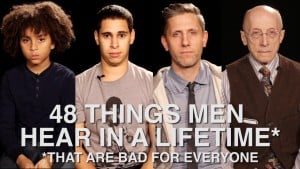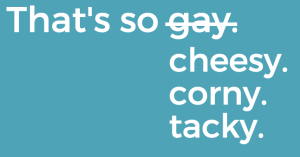Remember this one?
“Let’s get serious. Double-standard weight issues.”
I posted that video five years ago. Five years. And as you can imagine, I wanted to revisit it because a lot can change in five years, and let me tell you, re-watching that video was very difficult. Oh my goodness. I actually rarely watch videos after I’ve edited and uploaded them, because I just don’t super love watching myself, to be honest with you. Like, you know the first time you heard your voice recorded, and you were like, “Is that me? Is that what I sound like?” that’s kind of what I go through with every video I make. I love making them, but re-watching them is not super fun for me, so I don’t really do it.
But, okay, so a friend of mine mentioned to me recently that that was one of the first videos that she’d ever seen me do. So I thought, “I should go back and watch it and see what I was doing five years ago?”
As you can probably imagine, I’ve reformed my opinions and kind of changed how I feel about some things. I mean, five years is a lot of time for change.
To save you some time, here’s that video summed up:
“As a thin woman, I have, on more than one occasion, been told to, ‘Eat a cheeseburger!’ Why is it okay that someone can go up to me and tell me that I need to eat more?
So after I posted that video, I got this Tumblr message. Now I – especially at the time – was super active on Tumblr and I would post answers to messages all the time, so I don’t even know why this message has just stuck in my brain, but I remember it so clearly.
Basically what this girl said in this message was, you know, “I can see where you’re coming from in your video, but I don’t know if it’s super fair to equate the shame, you know, that gets tossed towards the direction of thin women to the shaming that fat people face.”
And I answered this question in my blog publicly, and I remember feeling so certain in my response, and I was just like, flat-out, I was like, “Nope. I mean obviously it’s not an equal playing-field, but it’s exactly the same thing: shaming one type of body is exactly the same as shaming another type of body. It’s exactly the same thing.”
[Sigh] So, I mean, I still wholeheartedly believe that no one should made to feel bad about their body, regardless of how it looks, or your size, or your ability. I still feel that way. However, focusing all my attention on the degradation of thin people really flies in the face of a reality that I’ve never had to live.
Because here’s the breakdown: I mean, I’m 5’2” and I weigh 115 pounds. I’ve been this size and height since I was 14. I’m a small person.
So what does it mean to be a small or thin cis person? Well, it means that I can go to virtually any mall or store and expect to find clothes in my size for a reasonable price. Unless it’s sold-out, online stores will almost always carry my size.
People don’t usually make assumptions about my health based on my size, which is actually really funny because I’ve actually had health issues my whole life, but people never assume that when they look at me.
Friends and family don’t ever try to get me to join weight loss or fitness programs. The assumptions that people make about me based on my size are generally positive, you know, “She must have a healthy lifestyle. She must eat well. She must not be lazy. She must be active.”
When I go to the doctor with something that’s bothering me, my problems won’t be immediately attributed to my weight, even with evidence to the contrary present.
I won’t be told, without so much as a second thought, that losing weight will definitely solve all of my problems.
I will be assessed properly.
I can wear yoga pants and tank tops without being considered sloppy. I can put significantly less work into my appearance without having to receive judgment for that.
If my weight and eating habits aren’t a big part of my life, no one will think that I’ve got my priorities in the wrong place.
If I wanted to have a child, no one would tell me I need to lose weight before becoming pregnant.
I can’t even imagine what it’s like to be a fat person on the Internet, but I see it. I see the crap that my friends receive online based on their weight and it’s unbelievable. And like, it’s funny, too, because there’s always like this age-old excuse that comes with any criticism that’s like, “I’m just concerned about their health, okay?!” Really? You’re concerned about their health? You’re a total stranger. You don’t know anything about them or how active they are or how they spend they time, or what kind of food they eat. You don’t know anything about them. You’re not concerned. You’re not concerned at all. You just need to package your rudeness in a way that enables you to justify it to yourself, like, “I’m not terrible. It’s, I’m concerned for their health!”
Okay, so just for a second, just for fun, let’s imagine for a second that the people who are being mean to people because they’re fat are genuinely 100% seriously doing it because they’re concerned for their health, and not because they’re fatphobic jerks. Okay, let’s just imagine: if you’re concerned, like actually seriously concerned for someone’s health, why are you addressing it in a way that is clearly meant to make them feel shamed?
Like, what person on this planet is going to say, “Oh my gosh, where do I begin? So I’m at the supermarket right, and I’m shopping for my family, and this woman comes over and she picks up a bag of chips that I had in my cart, and she holds them up to me and she says that I shouldn’t be buying these chips because they’re just going to contribute to the many health problems, that, you know, she’s decided that I have just by looking at me. And you know, I have to assume, you have to assume, that she’s a certified doctor, and not only a certified doctor, but my new doctor, because, I mean I don’t know how else she would know my health, you know, so intimately. So, that really humiliating and horrifying experience really led me to make some positive changes in my life, and here we are!”
No! It doesn’t work like that. Shame is not a motivational tool. Well, it’s not a good one. People rarely make changes that are good and healthy and stick because they were made to feel ashamed. Do you know what shame promotes? Let’s see: eating disorders, crash dieting, diet pills, emotional and stress eating, depression, suicide, just to name a few. But you’re just, you’re concerned for their health, right?
In the grand scheme of things, if someone makes a derogatory comment about my weight, if someone tells me to eat a cheeseburger, no, it’s not very nice of them, and yes, it maybe would hurt my feelings; but it’s more indicative of that person being a jerk than it is of a larger societal issue. Like, especially, if that remark is coming from a person who has had to face fat-shaming at some point in their life, I need to remind myself, in that moment, that it is not about me, it’s not about me personally. It’s not about me, and I don’t need to make it about me. The problem is that thin people are given the priority in virtually every aspect of life. Thin bodies are the most idealized and the most celebrated in our culture.
And the fact that I made a video dedicated to the, relatively speaking, incredibly minor difficulties I face as a thin person, it makes me less than proud. I just, I feel like I can do better, because I know better now, so…and so do you.
Thanks for watching. I’ll see you soon. Bye!




















